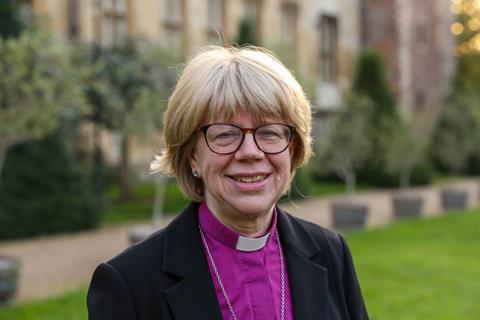With her experience both inside and outside of the Church, Dame Sarah Mullally is considered a safe pair of hands, says Tim Wyatt. But some say she is an uninspiring speaker and may not be up to leading the Church through the challenges it now faces

The next Archbishop of Canterbury will be the Rt Rev and Rt Hon Dame Sarah Mullally DBE, current Bishop of London.
The long-awaited announcement came eleven long months after the previous archbishop, Most Rev Justin Welby, was forced out of office over his involvement in an abuse scandal.
When Mullally takes up the role next year she will be a trailblazer. The 106th person to sit on the throne of St Augustine as Archbishop of Canterbury will also be the first ever woman. Mullally was one of the first female bishops back in 2015, shortly after CofE rules were changed – and she was also the first woman to become Bishop of London (the third most senior role in the Church) when she was promoted in 2017.
Mulally entered ministry later in life, having enjoyed a highly successful career in nursing. As a cancer nurse, she rose through the ranks during the 1990s, becoming the youngest ever chief nursing officer in the NHS. She then gradually moved into church work, initially working part-time alongside her NHS role.
In 2015, she was appointed Bishop of Crediton, a junior role in Devon, the third ever woman to rise to the rank of bishop in the CofE. Despite this somewhat obscure post, she was catapulted into national Church life shortly afterwards when she was tasked with leading safeguarding reforms (one survivor had requested a female bishop lead this, finding them more trustworthy than the male-dominated episcopate). Perhaps in reward for this, she was promoted to Bishop of London in 2017.
London calling
The Diocese of London was simultaneously one of the Church’s leading lights and also in a bit of a mess.
It was one of the very few dioceses bucking the nationwide trend of declining church attendance and was leading the way in church planting and innovation. Yet under the patrician hand of its long-time bishop, Richard Chartres, it had become riven with factions between warring theological tribes and dogged by safeguarding troubles.
With her administrative NHS expertise, Mullally was brought in effectively to modernise and professionalise the institution. She did this competently, but not without controversy. London has long been a hotbed of traditionalist Anglo-Catholic Anglicanism, and many of the old-fashioned male priests resented their new managerial overseer, not least because of her gender.
Her background will no doubt be pored over by media and abuse advocates alike
Shortly after her arrival in the diocese, Mullally also became entangled in a tragic safeguarding scandal. As she sought to oust one of Chartres’s fixers, a corrupt head of operations called Martin Sargeant - who it later emerged had stolen £5m from London churches - a catalogue of errors and a rambling exit interview triggered a botched investigation into an innocent priest.
Rev Alan Griffin was a retired gay cleric who had quit the CofE and joined the Catholic Church. Sargeant dripped untrue poison about him having sex with underage boys in the ears of his superiors as he left. The diocese swiftly launched an aggressive investigation, and the entirely innocent Griffin took his own life in despair, before being cleared. While not directly responsible, Mullally remains mistrusted by many clergy who were also subject to Sargeant’s smears and innuendo over how she handled the Griffin debacle.
An experienced and capable leader
Mullally also played a key role leading the CofE response to the Covid-19 pandemic, thanks to her healthcare background. However, this may serve to diminish her appeal to some clergy still sore about being told not to conduct even solo worship in their churches during the stay-at-home orders.
She previously also led the Living in Love and Faith project, which led to the introduction of blessings for same-sex couples for the first time. This lingering saga, which has provoked bitter internal conflict between liberals and conservatives, rumbles on. Many elements remain unresolved.
She may be a safe pair of hands, but is that what the CofE needs right now?
In many ways, Mullally was the obvious choice for archbishop. Of all the bishops who were appointable, she was by far the most experienced and senior - and also has an impressive CV outside of church work to point to. She is widely seen as a safe pair of hands – a competent administrator and bureaucrat who might be able to steer the CofE through its choppy waters.
She is known to be in favour of gay blessings and yet is not seen as major player in either liberal or conservative wings. She might therefore be able to find a narrow middle-ground compromise solution to the saga. Being a woman, she also presents a fresh face to the watching public, a very visible sign of how the national Church is changing and evolving.
Safe but not sure
And yet. There are risks in the relatively safe selection of Mullally as the next Archbishop of Canterbury. Given that abuse scandals toppled her predecessor and have continued to dog the Church ever since, it is surprising to some that Mullally has got the nod to succeed him.
Her background will no doubt be pored over by media and abuse advocates alike, and she will have to quickly find ways to reassure sceptics she does not have skeletons in the closet.
Mullally is also seen by some as an uninspiring speaker who lacks charisma or flair. She may be a safe pair of hands, but is that what the CofE needs right now? Does she have the personality and gifts to connect with a secularising nation and reinspire them to consider Jesus again? Can she be a pastor to the nation, leading confused and searching people back to church?
Even her introductory address at Canterbury Cathedral as she was unveiled as Archbishop of Canterbury-designate was merely competent, even pedestrian, despite touching on flashpoint issues such as assisted dying, asylum seekers and the recent antisemitic terrorist attack on a Manchester synagogue.
At a time when many across the wider Church are reporting an uptick in spiritual curiosity, it is undeniably risky for the CofE to be led by someone who might struggle to speak into this cultural moment in a fresh and compelling way.
She will only be able to serve a maximum of six years in the role before she hits the mandatory retirement age of 70. Historically, most Archbishops serve for more than ten years, giving them plenty of scope to introduce themselves to the nation and get to grips with the unwieldy and complex institutional machinery of the Church they lead.
Perhaps she has been handed the poisoned chalice of leading the CofE to act as a bridge: a turnaround leader who tries to draw a line under the safeguarding scandals and endless sexuality wars, so she can then hand over the Church to a younger and fresher face in a few years’ time.






































2 Readers' comments